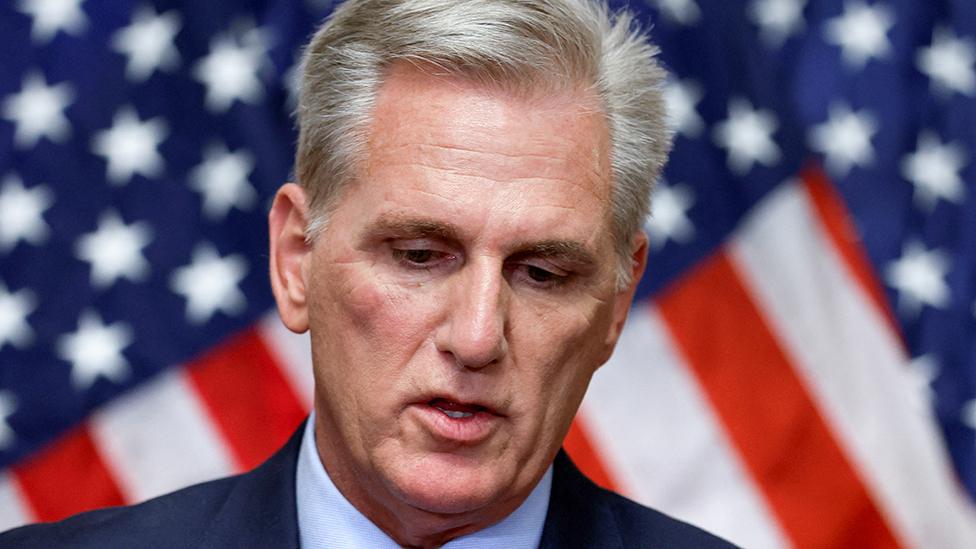House speakership up in air as resistance to Jim Jordan hardens
- Published

Jim Jordan secured only 200 votes in the first round of voting, with 20 Republicans voting against him
Republican Jim Jordan has lost the first vote in his bid to become Speaker of the US House of Representatives amid stiff opposition from members of his own party.
Despite intense lobbying behind the scenes, 20 Republicans refused to back the right-wing Ohio congressman.
The Trump ally abandoned plans to hold a second vote until Wednesday morning.
The lower chamber of Congress has been leaderless since an unprecedented vote to oust Kevin McCarthy 15 days ago.
Without a Speaker, the House is unable to pass any bills or approve White House requests for emergency aid. That includes potential help for Israel amid its war with Hamas.
Mr Jordan earned 200 votes in the first ballot on Tuesday, but he needs 217 - indicating majority support in the chamber - to secure the Speaker's gavel.
The Democratic nominee, Hakeem Jeffries of New York, earned 212 votes, all from his fellow colleagues in the minority party.
Mr Jordan vowed to "keep working" and expressed confidence he would ultimately emerge victorious.
"We're making progress. I feel good about it," he told reporters. "We're gonna keep going."
Mr Jordan can only afford to lose four Republican votes in a chamber that his party controls by 221-212.
The House Judiciary Committee chairman initially said a second vote was planned for Tuesday, but later said it would instead take place at 11:00 (15:00 GMT) on Wednesday.
Republicans who refused to pick Mr Jordan voted instead for Kevin McCarthy, the former Speaker who was ousted on 3 October, or picked other candidates.
Three even voted for Lee Zeldin, a New York congressman who retired from the House in January this year.
A bloc of New York Republicans who voted against Mr Jordan cited his opposition to benefits for survivors of the 9/11 attacks, among other political issues.
But another New York Republican, Elise Stefanik, called Mr Jordan "a patriot, an America First warrior who wins the toughest of fights".
Mr Jordan has a record of feuding with members of his own party. He is a founding member of the ultra-conservative House Freedom Caucus, a group once labelled "legislative terrorists" by former Republican Speaker John Boehner.
Watch: Jim Jordan: Three things to know about the conservative firebrand
Mr Jordan held meetings after Tuesday's vote with some of the Republicans who voted against him.
Several, however, suggested they would not budge, and some indicated the number of votes against Mr Jordan might actually grow.
Colorado Republican Ken Buck said the Ohio congressman had still not acknowledged former President Donald Trump's 2020 election loss to Joe Biden.
Another Republican who voted against Mr Jordan, Mario Diaz-Balart, of Florida, said he did not feel "pressure at all" to change his vote.
He added that any effort to "intimidate" him would end any negotiations. "If that's the case, that's where you lose me," he said.
Oregon's Lori Chavez-DeRemer, another of the anti-Jordan holdouts, suggested granting interim Speaker Patrick McHenry, a North Carolina Republican, additional powers to allow the House to function during the impasse.
Byron Donalds, a Florida Republican who supports Mr Jordan, told the BBC he was surprised at how many people had voted against him.
Revelling in the Republican dysfunction, Democrats are depicting Mr Jordan as an extremist.
California's Pete Aguilar described him as "a vocal election denier".
California Democrat Nancy Pelosi - a two-time former Speaker - told reporters Mr Jordan had clearly underestimated resistance to him.
Republicans, she told reporters, were "taking lessons on mathematics and how to count".
In a news conference, Democratic minority leader Mr Jeffries offered to work with Republicans to find a Speaker that could suit both parties.
"There have been ongoing informal conversations that have been undertaken over the last few days," he said.
"There's a possibility those can accelerate now that Jim Jordan clearly does not have the votes for Speaker."
If support for Mr Jordan collapses, the next potential Speaker candidate is Minnesota's Tom Emmer, who is the third highest-ranking Republican in the House.
The last Speaker, Mr McCarthy, needed 15 rounds of voting over four days in January to win the gavel.
Fierce resistance to Ukraine war funding among Republican hardliners, including Mr Jordan himself, contributed to the unprecedented vote that led to Mr McCarthy's ouster this month.
The speakership is second-in-line to the presidency after the vice-president.
Related topics
- Published16 October 2023

- Published4 October 2023

- Published4 October 2023
